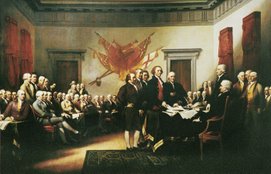
"Inalienable" (or "unalienable") is a term borrowed from English common law. Some property rights were alienable (they could be sold or granted) and some were inalienable (they could only be inherited according to fixed rule). The distinction between alienable and unalienable rights was introduced by Frances Hutcheson (philosopher) in his A System of Moral Philosophy (1755) based on the Reformation principle of the liberty of conscience. One could not in fact give up the capacity for private judgment (e.g., about religious questions) regardless of any external contracts or oaths to religious or secular authorities so that right is "unalienable." In discussions of social contract theory, "inalienable rights" were said to be those rights that could not be surrendered by citizens to the sovereign. Such rights were thought to be natural rights, independent of positive law. Natural rights date back at least to the Roman Empire, and were recognized during medieval times, but in this context are an element of the classical liberalism of the 18th and 19th centuries. Classical Liberal thinkers reasoned that each man is endowed with rights, of which the rights to life, liberty and property were thought to be fundamental. However, they reasoned that in the natural state only the strongest could benefit from their rights. Each individual forms an implicit social contract, ceding his or her rights to the authority to protect his or her right from being abused. For this reason, almost all classical liberal thinkers, for example, accepted the death penalty and incarceration as necessary elements of government. In England and America the 17th-century philosopher John Locke discussed natural rights in his work, and identified them as being "life, liberty, and estate (or property)", and argued that such fundamental rights could not be surrendered in the social contract. These ideas were claimed as justification for the rebellion of the American colonies. As George Mason stated in his draft for the Virginia Declaration of Rights, "all men are born equally free," and hold "certain inherent natural rights, of which they cannot, by any compact, deprive or divest their posterity." Jefferson took his division of rights into alienable and unalienable from Hutcheson, who made the distinction popular and important."In the The 1776 United States Declaration of Independence, Thomas Jefferson famously condensed this to:
"We hold these truths to be self-evident, that all men are created equal, that they are endowed by their Creator with certain unalienable Rights. . ." (from Wikipedia)
"We hold these truths to be self-evident, that all men are created equal, that they are endowed by their Creator with certain unalienable Rights. . ." (from Wikipedia)


No comments:
Post a Comment